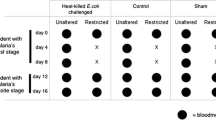Abstract
We develop a theory for host seeking decisions in mosquitoes that explicitly considers the tradeoffs mosquitoes face in allocation to somatic and gametic function. Specifically, we consider conditions under which mosquitoes should seek out nectar and blood hosts upon encountering host odours. Results from development of a dynamic model that considers free and crop energy states suggest that mosquitoes should seek out blood hosts under a wide variety of conditions but that decisions to seek nectar depends upon crop volume, concentration and free energy. This pattern arises because mosquitoes carrying large crop loads are constrained in their ability to obtain large blood meals due to space limitations in the abdomen. The predicted patterns of behaviour are supported by published observations of mosquito behaviour.
Similar content being viewed by others
Literature
Bell, G. and V. Koufopanou. 1988. The cost of reproduction.Oxford Survey Evol. Biol. 5, 83–131.
Bowen, M. F., E. E. Davis and D. A. Haggart. 1988. A behavioural and sensory analysis of host-seeking behaviour in the diapausing mosquitoCulex pipiens.J. Insect Phys. 34, 805–813.
Briegel, H. 1985. Mosquito reproduction: incomplete utilization of the blood meal protein for oogenesis.J. Insect Phys. 31, 15–21.
Briegel, H. 1990. Fecundity, metabolism and body size inAnopheles, vectors of malaria.J. Med. Entomol. 27, 839–850.
Foster, W. and F. A. Eischen. 1987. Frequency of blood feeding in relation to sugar availability inAedes aegypti andAnopheles quadrimaculatus.Annls. Ent. Soc. Am. 80, 103–108.
Jones, J. C. and B. V. Madhukar. 1976. Effects of sucrose on blood avidity in mosquitoes.J. Insect Phys. 22, 357–360.
Klowden, M. 1992. The endogenous regulation of mosquito reproductive behaviour.Experentia (in press).
Mangel, M. and C. W. Clark. (1988).Dynamic Modelling in Behavioural Ecology. Princeton: Princeton University Press.
Nayar, J. K. and E. van Handel. 1971. The fuel for sustained mosquito flight.J. Insect Phys. 17, 471–481.
Ribeiro, J. 1988. How insects find blood.Misc. Pub. Ent. Soc. Am. 68, 18–24.
van Handel, E. and J. F. Day. 1990. Nectar-feeding habits ofAedes taeniorynchus.J. Am. Mosq. Control Assoc. 6, 270–273.
Vargo, A. M. and W. A. Foster. 1982. Responsiveness of femaleAedes aegypti to flower extracts.J. Med. Ent. 19, 710–718.
Author information
Authors and Affiliations
Rights and permissions
About this article
Cite this article
Roitberg, B.D., Friend, W.G. A general theory for host seeking decisions in mosquitoes. Bltn Mathcal Biology 54, 401–412 (1992). https://doi.org/10.1007/BF02464840
Received:
Revised:
Issue Date:
DOI: https://doi.org/10.1007/BF02464840




